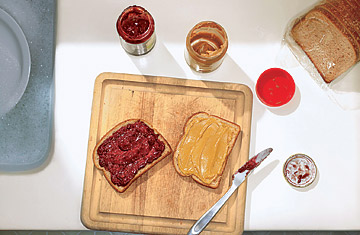
The recent salmonella outbreak at the Peanut Corporation of America has led to the recall of more than 1,800 peanut-containing products, from off-brand dog biscuits to Trader Joe’s vegan pad Thai, and sent sales of peanut butter plunging 25%, despite assurances that jars on supermarket shelves are not tainted. But the panic illustrates just how thoroughly the legume (Arachis hypogaea is, technically, not a nut), fashioned into a paste, has permeated the American diet. Spread on crackers, slathered on celery, melted with chocolate: peanut butter goes with almost anything.
Peanut butter’s true inventor is unknown, but Dr. John Harvey Kellogg has as good a claim to the title as anyone. In 1895, the cereal pioneer patented a process for turning raw peanuts into a butter-like vegetarian health food that he fed to clients at his Battle Creek, Mich., sanatorium. The taste caught on, and in a few years, the spread had gone mainstream.
In 1922, chemist Joseph Rosefield fixed peanut butter’s tendency to separate by adding hydrogenated vegetable oil; he called the thick, creamy result Skippy (probably after a popular comic strip), and a brand was born. Within the decade, Skippy was fighting it out with other established brands like Peter Pan and Heinz. Peanut butter and jelly sandwiches invaded children’s lunch boxes soon after: by one 2002 estimate, the average American child eats 1,500 PB&J sandwiches before graduating from high school. In the 1990s, nut-allergy fears led some schools to eliminate peanuts from cafeteria menus. Still, peanut butter remains an $800 million industry–which is one of the reasons Jif and Peter Pan are spending millions on new ad campaigns to remind consumers how good food that sticks to the roof of your mouth can be.
More Must-Reads from TIME
- Donald Trump Is TIME's 2024 Person of the Year
- Why We Chose Trump as Person of the Year
- Is Intermittent Fasting Good or Bad for You?
- The 100 Must-Read Books of 2024
- The 20 Best Christmas TV Episodes
- Column: If Optimism Feels Ridiculous Now, Try Hope
- The Future of Climate Action Is Trade Policy
- Merle Bombardieri Is Helping People Make the Baby Decision
Contact us at letters@time.com